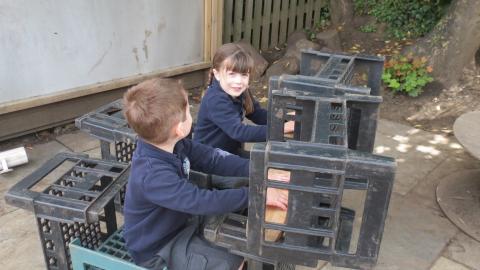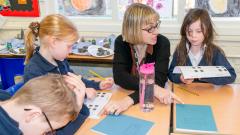We believe that RE offers the chance for all members of the school community to develop their spirituality, reflecting on their own values and beliefs and growing in respect for and understanding of those who are different from them. At Chapel Haddlesey school, pupils and their families can expect a high-quality religious education (RE) curriculum that is rich and varied, enabling learners to acquire a thorough knowledge and understanding of a range of faiths and world views. We teach according to the North Yorkshire SACRE Agreed Syllabus.
As a church school, the teaching of Christianity is at the heart of our RE curriculum. We aim to embed the Understanding Christianity resource to develop an enquiry approach, engaging with significant theological concepts and the pupil’s own understanding of the world as part of their wider religious literacy. Links with our school vision, and support for pupil’s spiritual, moral, social and cultural (SMSC) development are intrinsic to our RE curriculum and have a significant impact on learners. We provide a wide range of opportunities for learners to understand and to make links between the beliefs, practices and value systems of the range of faiths and world views studied.
As stated in the Church of England Statement of Entitlement for Religious Education, our school aims for all pupils:
• To know about and understand Christianity as a diverse global living faith through the exploration of core beliefs using an approach that critically engages with biblical text.
• To gain knowledge and understanding of a range of religions and worldviews appreciating diversity, continuity and change within the religions and worldviews being studied.
• To engage with challenging questions of meaning and purpose raised by human existence and experience.
• To recognise the concept of religion and its continuing influence on Britain’s cultural heritage and in the lives of individuals and societies in different times, cultures and places.
• To explore their own religious, spiritual and philosophical ways of living, believing and thinking.
Curriculum for Religious Education
RE is an academic subject that has a high profile in our school curriculum. It is a priority for senior leaders, who ensure that the teaching, learning and resourcing of RE is comparable with other curriculum subjects.
This means that the RE curriculum:
• is intrinsic to the outworking of our distinctive Christian vision in enabling all pupils to flourish. In addition, it contributes to British values and to pupils’ spiritual, moral, social and cultural development.
• is delivered in an objective, critical and pluralistic manner to engage and challenge all pupils through an exploration of core concepts and questions. Lessons provide meaningful and informed dialogue with a range of religions and worldviews.
• reflects a good balance between the disciplines of theology, philosophy and human science, to enable pupils to develop their religious literacy.
• enables pupils to acquire a rich, deep knowledge and understanding of Christian belief and practice, including the ways in which it is unique and diverse, whilst engaging with biblical texts and theological ideas.
• provides opportunities for pupils to understand the role of foundational texts, beliefs, rituals, and practices and how they help to form identity in a range of religions and worldviews.
• supports the development of other curriculum areas and other general educational abilities such as literacy, empathy and the ability to express thoughts, feelings and personal beliefs.
• encompasses the full range of abilities to ensure that all flourish academically, using a wide range of teaching and learning strategies which consider the task, outcome, resource, support and pupil grouping as appropriate to pupils’ needs
• offers tasks that are age appropriate, challenging and sufficiently demanding to stimulate and engage all pupils, whilst extending the most able and providing support for those who need it.
• ensures that all pupils’ contributions are valued in RE as they draw on their own experiences and beliefs
Curriculum balance and time
Parents and pupils are entitled to expect that, in Church schools, Christianity should be the majority religion studied in each year group and should be at least 50% of curriculum time. Sufficient dedicated curriculum time, meeting explicitly RE objectives, however organised, should be committed to the delivery of RE. This should aim to be close to 10% but must be no less than 5% in key stages 1-4.
Time Allocation.
It is recommended that RE is taught for a minimum of 36 hours per year at Key Stage One, and 45 hours per year at Key Stage Two, (this reflects 5% see above)
The time allocated for teaching RE at Chapel Haddlesey Primary School is:
EYFS planned within the EYFS Framework
KS1 2 hours
KS2 2 hours
Scheme of Work
Teachers work from the North Yorkshire Agreed Syllabus for RE. As such, all pupils will study the following religious traditions during their time in school:
EYFS themes emerging from the EYFS Framework.
KS1 Christianity, Islam and Judaism.
KS2 Christianity, Islam, Judaism and Hinduism.
Teaching and learning
We recognise the importance of teaching RE in a creative, knowledge-rich, broad and balanced way. Building from the agreed syllabus, our RE teaching aims to ensure that all pupils:
- Know about and understand a range of religious worldviews.
- Express ideas and insights about the nature, significance and impact of religions and worldviews. - Gain and deploy the skills needed to engage seriously with religions and worldviews.
Learning activities provide fully for the needs of all pupils, so that they develop a wide range of skills including enquiry, analysis, interpretation, evaluation and reflection. They provide opportunities to engage in meaningful and informed dialogue with those of all religions and worldviews. RE lessons provide a safe space to explore their own religious, spiritual and/or philosophical ways of seeing, living and thinking, believing and belonging.
Pupils experience opportunities to learn and express themselves through an enquiry-based style of learning by:
• Posing and discussing ‘big’ and challenging questions
• Interpreting information from different sources.
• Listening to and discussing with the teacher and other pupils.
• Engaging in pair and group work.
• Exploring a range of media such as artefacts, pictures, photographs, music and drama.
• Experiencing visits and visitors.
• Taking time for reflection.
Teaching in RE challenges stereotypes, misinformation and misconceptions about race, gender and religion. Lessons seek to present religions and world views in all their richness and diversity in terms of beliefs, traditions, customs and lifestyle in a sensitive and accurate way in order to encourage a positive attitude towards diversity. Questions, views, and opinions are treated with sensitivity and respect.
Teaching enables pupils to gain something of personal value from their study of religious belief and practice, for example, the way that they might apply insights gained from religious stories to their own lives.
Cross-curricular links
Our RE syllabus works alongside our ‘Guerrilla’ school curriculum, to broaden pupils’ horizons and increase their empathy for diverse and contrary worldviews. Religious education supports the development of general educational abilities such as literacy, empathy, and the ability to express thoughts, feelings and personal beliefs. RE also makes a major contribution to pupils’ SMSC development. It addresses issues which arise in a range of subjects, such as English, art, drama and history, geography, computing, music as well as personal, social and emotional education and citizenship.


